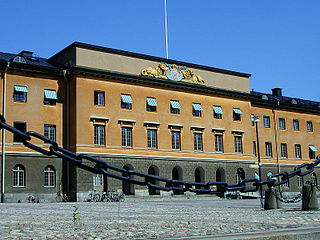
Gellert Tamas is a Swedish journalist and writer of Hungarian origin.
Kontoret för särskild inhämtning (KSI), "The Office for Special Acquisition", is part of the Swedish Military Intelligence and Security Service (MUST) and also one of the most secret parts of the Swedish Armed Forces. The previous names until 1994 were: T-kontoret (1946–1964), IB (1965–1973), Gemensamma byrån för underrättelser (GBU) (1973–1982) and Sektionen för särskild inhämtning (SSI) (1982–1994).

Stallmästaregården is a historic inn adjacent to the park around the Royal Pavilion at Haga in Solna, just north of the city limits of Stockholm, Sweden. Today, Stallmästaregården is a restaurant with hotel operation.
The Ministry for Rural Affairs, known between 1900 and 2010 as the Ministry of Agriculture, was a ministry within the government of Sweden. The ministry was responsible for matters relating to rural areas, food and land- and water-based industries, regional development, transport and infrastructure, housing, and community planning. The ministry was headed by the minister for rural affairs (2011–2014) and the minister of agriculture (1900–2010). The ministry was disbanded on 31 December 2014, and from 1 January 2015, the matters was handled by the Ministry of Enterprise and Innovation.

The Swedish National Heritage Board is a Swedish government agency responsible for World Heritage Sites and other national heritage monuments and historical environments. It is governed by the Ministry of Culture.

The Nordische Gesellschaft was an association founded in 1921, with the objective of strengthening German-Nordic cultural and political cooperation. It was based in Lübeck, Germany. The association had both German and Scandinavian members. After the Nazi Party's takeover of Germany in 1933, the Nordische Gesellschaft came under the control of Alfred Rosenberg. A new board was formed. Rosenberg's ambition was that the organization could be utilized for the Nazi cause. Heinrich Himmler became a member of the board.
A Norwegian Official Report is a report published by a panel or committee appointed by the Norwegian government. The Norwegian Parliament may request the government to establish, such a committee.
Ny Dag was a Swedish communist newspaper and the main publication of the Communist Party of Sweden from 2 January 1930 to 5 August 1990, when publication stopped.
Sydsvenska Kuriren was a communist newspaper in Sweden. The publication was an organ of the Communist Party of Sweden. The first issue appearedon October 24, 1925. Sydsvenska Kurirern was launched in the fall of 1925, as an edition of Kalmar Läns-Kuriren. It was published on Wednesdays and Saturdays. The newspaper was edited and printed in Oskarshamn. Edvin E. Persson was the editor of the newspaper during this period.

Göran Ola Tunander is a research professor emeritus at the Peace Research Institute Oslo. He worked as a researcher at PRIO in the period 1987-2016. He is the son of Museum Director Ingemar Tunander and his first wife Gunvor. Tunander is married to the Chinese scholar Yao Xiaoling. He has written and edited 12 books and a number of articles on security politics, naval strategy, submarine operations, geopolitics, dual state, psychological operations (PSYOP) and Cold War history.

Compulsory sterilisation in Sweden were sterilisations which were carried out in Sweden, without a valid consent of the subject, during the years 1906–1975 on eugenic, medical and social grounds. Between 1972 and 2013, sterilisation was also a condition for gender reassignment surgery.

Major General Fritz Erling Paul Degerlund is a retired Swedish Army officer. Degerlund's senior commands include Inspector General of the Swedish Army and commanding officer of the Southern Military District.
Underlöjtnant was the lowest officer rank in the Swedish Army from 1835 to 1937 instead of the previous ranks of fänrik and cornet. Fänrik was reintroduced in 1914 with the same position as underlöjtnant, from 1926 with lower position.

Fredrik Wetterqvist is a Swedish diplomat and music administrator.

The FreedomofthePressAct is one of four Fundamental Laws of the Realm and thus forms part of the Swedish Constitution. The Act regulates matters regarding freedom of press and principle of public access to official records. The Freedom of the Press Act as well as the Fundamental Law on Freedom of Expression is one of the two "basic media acts" in Sweden. The Freedom of the Press Act is derived from the Freedom of the Press Act of 1766; the legislation is regarded as the world's first law supporting the freedom of the press and freedom of information.

The Committee on European Union Affairs is a governmental body in the Swedish Riksdag, where the Riksdag and the Swedish Government consult matters and issues about the European Union (EU). In the EU Committee, Sweden's negotiating position is determined prior to a meeting between the European Council and the Council of the European Union.
The Medal for Noble Deeds is a Swedish medal intended to honour personal courage in a civilian context. It is used to honour not only the noble deed of lifesaving but also courage and presence of mind. Since its inception in 1832, the medal has been awarded in gold in two sizes and in silver in one size.
Carl Gunnar Lidbom was a Swedish jurist. He served as minister of commerce and industry from 1975 and 1976 and as Ambassador of Sweden to France from 1982 to 1992. During his time in the Government Offices, he worked, among other things, on drafting a new Swedish constitution, which transformed the Riksdag from a bicameral legislature into a unicameral one.
The Ministry of the Budget was a ministry in Sweden established in 1976. The ministry was primarily responsible for budget regulation as well as the general administration and accounting of state funds, the state and municipal tax system. The ministry was headed by the minister for the budget. The ministry ceased to exist in 1982.










